

Written by Stephen Day
Gas Safe Engineer
Updated: 27th October, 2025
If your boiler is leaking water, it’s likely due to pressure or worn parts. Acting fast helps prevent damage and keeps your heating system running safely.
Get a new boiler quote, save up to £550 per year (0% APR available).
If you’ve noticed water dripping from your boiler, it’s important to act quickly. A boiler leaking water can indicate internal pressure issues, worn components or pipe damage.
Left untreated, even a small leak can lead to bigger problems, such as system corrosion, loss of heating efficiency or complete boiler failure.
Boilers can leak for several reasons, most of which stem from pressure imbalances, ageing parts or general wear and tear.
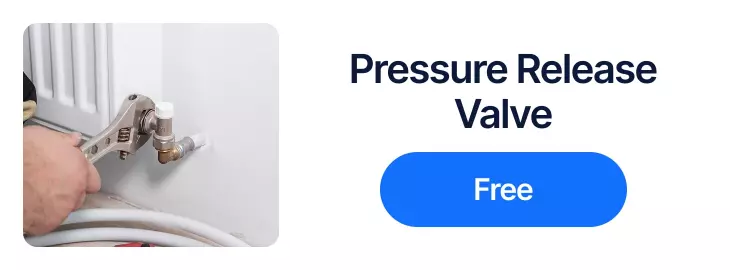
Issue:
If your boiler’s pressure is above the recommended level (usually 1 to 2 bar when cold), the pressure relief valve may release water to protect the system. This can appear as dripping or pooling underneath the boiler.
Fix:
Turn off the heating, allow the system to cool, and check the pressure gauge. If it’s too high, slowly release some water from a radiator bleed valve or follow your boiler manual’s repressurising instructions.
Is it repairable?
Yes, if caught early. Persistent high pressure could indicate a faulty expansion vessel or filling loop that needs professional attention.
Cost?
Free! You can release pressure from your system yourself (if you need to learn how to do this safely checkout our quick video guide below).

Issue:
Over time, moisture and oxygen in the system can cause corrosion on pipes or joints. Rubber seals and washers may also deteriorate, allowing small leaks to form around connections.
Fix:
An engineer will inspect and replace any worn seals, clean the affected areas and apply corrosion inhibitors to the system.
Is it repairable?
Yes. Most leaks from worn seals can be fixed without major disruption.
Cost?
£150 to £250
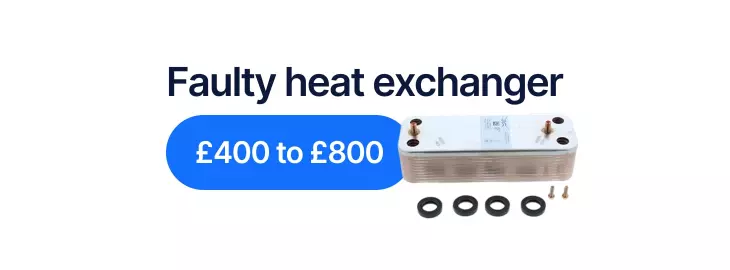
Issue:
The heat exchanger transfers heat from gas to water inside your boiler. If it becomes cracked or damaged, water can escape internally and appear as dripping from the base of the unit.
Fix:
This fault requires professional assessment. In some cases, a replacement heat exchanger can restore the system, but often replacement is more economical.
Is it repairable?
Sometimes, but replacement is common due to labour and part costs.
Cost?
£400 to £800 (depending on cost of parts)

Issue:
Vibration and pressure fluctuations can loosen connections over time. Small leaks may appear around joints or fittings, especially in older systems.
Fix:
Tightening or resealing the affected joint is usually all that’s needed. An engineer can also check for signs of corrosion or stress that could cause future leaks.
Is it repairable?
Yes, usually a simple fix.
Cost?
£100–£200 in labour
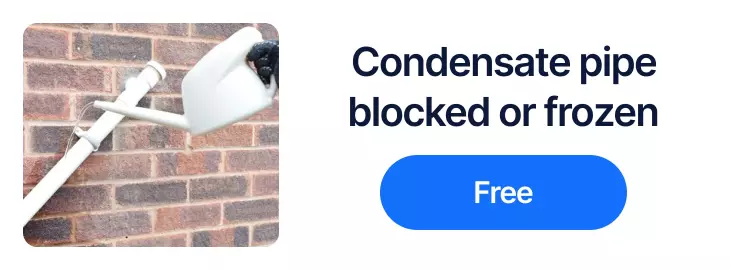
Issue:
Modern boilers produce condensate that exits through a plastic pipe. In cold weather, this pipe can freeze or become blocked, causing water to back up into the boiler.
Fix:
Safely thaw the pipe using warm (not boiling) water or a hot water bottle. If blockage is due to debris, a professional can clear it and check the trap.
Is it repairable?
Yes, and usually straightforward.
Cost?
Free, you can fix this yourself

Issue:
The expansion vessel absorbs pressure changes when your heating system heats up and cools down. If it fails or loses charge, pressure can rise too high and force water out through the relief valve.
Fix:
A Gas Safe-registered engineer can repressurise or replace the expansion vessel.
Is it repairable?
Yes, with the right tools and parts.
Cost?
£300 and £500 (dependent on part costs)
Cause | Fix | Cost |
|---|---|---|
Pressure too high | Release pressure from boiler | Free (release system pressure) |
Corrosion or worn seals | Replace seals, add inhibitor | £150 to £250 |
Faulty heat exchanger | Replace or consider new boiler | £400 to £800 |
Loose joints or pipe fittings | Tighten or reseal connections | £100 to £200 |
Condensate pipe blocked | Thaw or clear blockage | Free |
Expansion vessel failure | Repressurise or replace vessel | £300 to £500 |
Different leak points can indicate different issues. Understanding where the water is coming from helps narrow down the cause.
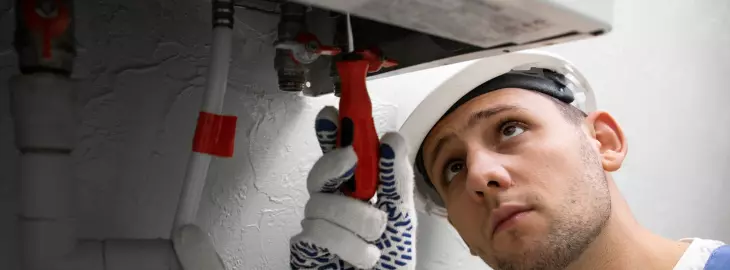
Usually caused by high pressure, worn seals or an expansion vessel issue.
You might see small drops of water pooling on the floor beneath the boiler, or wet marks on the casing’s underside.
Boiler pressure above safe operating range (often above 2 bar) forces water out via safety valves or seals.
Worn or degraded rubber seals/gaskets under the boiler or at joints.
Faulty expansion vessel (it has lost its air-charge and cannot absorb the system’s expansion) so when water expands the excess is forced out.
Check boiler pressure monthly. Keep it between 1.0‐2.0 bar (check manufacturer’s spec).
Annual service to test expansion vessel, seals, and pressure relief valve.
Ensure system has a proper maintenance schedule to avoid wear from frequent cycles.
If water drips steadily from inside the boiler casing, a cracked heat exchanger could be the reason. This fault often makes repair uneconomical.
You may see water dripping from within the boiler itself, not external pipework. Steam or hissing sounds might occur when the boiler is running, and the pressure may drop repeatedly.
Cracks in the primary heat exchanger caused by metal fatigue or corrosion.
Limescale buildup leading to overheating and stress fractures.
Age-related wear in older boilers, especially those over 10 years old.
Have the system flushed and inhibitor added to prevent corrosion and scale.
Book annual servicing to check for internal leaks early.
Replace ageing boilers before corrosion weakens key components.
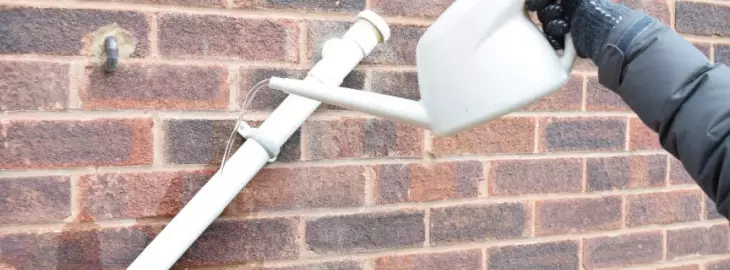
A common issue in winter. Freezing or blockage in the condensate pipe can cause pooling or dripping at the boiler’s base.
You may notice water dripping from the white plastic pipe outside your home, or gurgling sounds from the boiler before it locks out with an error code.
Condensate pipe frozen due to cold weather.
Blockage caused by dirt or sludge in the pipe.
Incorrect pipe fall or routing preventing proper drainage.
Insulate the external part of the condensate pipe.
Keep the pipe short and with a continuous downward fall.
In very cold weather, pour warm (not boiling) water over the frozen section to thaw it.
Ask your engineer to re-route or upgrade the pipe to a larger diameter if it freezes often.
Older boilers may develop leaks around joints and internal seals due to corrosion and age-related wear.
You might spot damp patches around internal components, visible corrosion near connections, or an occasional drip when the boiler is operating.
Perished rubber or fibre seals inside the boiler.
Corrosion from untreated or acidic system water.
High pressure or heat cycles causing expansion and contraction at joints.
Keep inhibitor levels topped up to protect against corrosion.
Schedule annual boiler servicing to replace worn seals early.
Maintain stable system pressure to reduce stress on joints and gaskets.
If your boiler is leaking you can (in some instances) try small fixes, but most of the time it's best to call a Gas Safe-registered engineer.
Immediate steps before calling a professional - Turn off your boiler and water supply. Mop up any pooled water to prevent damage, but avoid opening panels or touching internal parts.
Small fixes you can try safely - If pressure is too high, release some water from a radiator using the bleed valve. You can also gently tighten any visible external joints if they are clearly loose.
When you must call a Gas Safe-registered engineer - If water continues to drip or you cannot locate the source, contact a qualified professional. iHeat’s Gas Safe-registered engineers can safely diagnose and repair leaks while checking for underlying pressure or component issues.
What a professional repair involves - An engineer will inspect the entire heating system, identify the source of the leak and replace or reseal affected components. They will also run pressure tests and ensure the boiler is safe to use again.
Prevention is the best long-term solution. With regular maintenance and care, most leaks can be avoided entirely.
Regular servicing and pressure checks - Have your boiler serviced annually by a Gas Safe-registered engineer. They will check for corrosion, worn seals and pressure stability.
Installing corrosion filters and inhibitor fluids - Magnetic system filters capture rust and debris before they reach the boiler. Inhibitor fluids protect internal metal surfaces and reduce corrosion risk.
Keeping condensate pipes clear - Insulate outdoor pipes to prevent freezing and blockages during winter.
Monitoring boiler pressure monthly - Pressure can change with temperature. Check your boiler gauge occasionally to make sure it remains within the safe range.
Tips for spotting early signs of internal corrosion - Listen for kettling noises, check for discolouration near joints and keep an eye on water quality when bleeding radiators. Acting early prevents costly repairs later.
Boiler leaks usually stem from worn seals, high pressure, corrosion, or a failing internal component such as the heat exchanger.
Identifying where the leak comes from helps narrow down the cause and avoid unnecessary repairs.
Even small drips should be checked promptly to prevent long-term damage or system failure.
Keeping the boiler serviced annually, maintaining correct system pressure, and using corrosion inhibitor in your heating water are simple but effective ways to prevent leaks and extend your boiler’s lifespan.
If you’re unsure about the source or safety of a leak, always contact a qualified Gas Safe-registered engineer to inspect it.
Last updated: 27th October, 2025

Written by Stephen Day
Gas Safe Engineer at iHeat
Stephen Day is a Gas Safe registered and FGAS certified engineer with over 20 years of hands-on experience in the heating, cooling, and renewable energy industry, specialising in boiler installations, air conditioning, and heat pump systems.
LinkedInArticles by Stephen Day are reviewed by iHeat’s technical team to ensure accuracy and reliability.

27th February, 2026
Condensing boilers are considered to be some of the most efficient boilers out there on th...
 Read Article
Read Article

26th February, 2026
Vaillant boilers use a variety of parts to ensure efficient operation. This section looks...
 Read Article
Read Article

26th February, 2026
Leaving the heating on low all day might seem like a way to avoid the chill without bursti...
 Read Article
Read Article
No obligation. Takes less than 60 seconds.